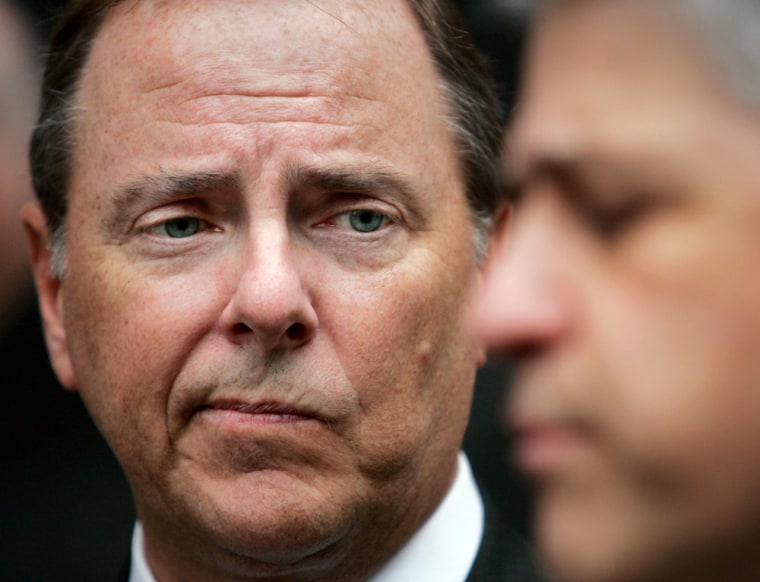A hatchet is almost as useful as a law degree when you slog through the indictment of former Enron chiefs Kenneth Lay and Jeffrey Skilling — 65 pages on investment grade ratings, cash flow levers and special-purpose entities.
The challenge for lawyers will be to make their cases in the complex fraud trial easy to understand for jurors, who are expected to sit for months of 8 1/2-hour days in a Houston courtroom.
Corporate prosecutions can come down to which side, prosecutors or defense lawyers, offers jurors a more understandable and persuasive story — who can boil down a blizzard of documents and jargon into a narrative driven by witnesses.
“In the bowels of every complex case is a theme as compelling as the simplest murder case,” said David Berg, a Houston trial lawyer and author of “The Trial Lawyer: What It Takes to Win.”
In the Enron trial, those themes are likely to pit a portrayal of the men as upstanding corporate leaders who were unaware subordinates were cooking the books against a picture of them as crooked executives bent on pumping up Enron stock for their own gain, he said.
Jury selection is set to begin Monday in Houston. Skilling and Lay are fighting charges that they concealed Enron’s crumbling financial state in order to keep its stock price high and its credit rating favorable, all the while getting rich off salary, bonuses and stock options.
For prosecutors, a key challenge in the case will be making sure jurors aren’t bogged down by the arcane details of Enron’s finances — a bewildering set of off-the-books financial structure that hid billions of dollars of debt.
That puts enormous pressure on prosecutors’ opening statement and closing argument.
“You have to tell the jury that Skilling and Lay encouraged the public and their employees to buy stock in Enron when they knew it was not going to meet their numbers,” Berg said.
“And that analogy is strong enough — the sinking ship — to cut through reams of data, to explain very simply that the accounting is rigged and the numbers were false,” he said.
Indeed, just hours after Lay was indicted in July 2004, prosecutors publicly sought to portray him as a man who hid information from investors and employees, abusing a position of public trust as CEO.
That portrayal is straight out of the playbook of some of the Justice Department’s most successful white-collar prosecutions in era wave of corporate scandals touched off by the fall of Enron in 2001.
For example, in last year’s trial of former WorldCom chief Bernard Ebbers — a case that led to a big conviction for the government — a prosecutor led off this way:
“When people buy stock in a company, they purchase the right to be told the truth. Bernard Ebbers violated that trust. He violated that trust by directing this fraud, and then telling lie after lie after lie about how his company, WorldCom, was performing.”
In a likely preview of his defense in court, Lay has insisted he did nothing wrong at Enron and unwittingly left the finances to a crooked subordinate, former Enron chief financial officer Andrew Fastow.
Fastow has already pleaded guilty in the case and is expected to testify for the government against Lay and Skilling.
In a December 2005 speech to business and academic leaders — one widely broadcast by the media — Lay also wrapped himself in the language of Churchill and painted himself a victim of a “wave of terror” by Enron prosecutors.
“The upstanding-corporate-citizen story is an alternative that people are familiar with,” said Valerie Hans, a visiting scholar at Cornell Law School who has studied jury behavior.
It was a narrative that worked for former HealthSouth chief Richard Scrushy, who was acquitted of fraud charges by an Alabama jury last year after his lawyer described him as an everyman CEO who worked hard but was kept in the dark by criminal subordinates who controlled the company’s books.
Before Enron collapsed in 2001, Lay was a Houston-area hero with a long history of philanthropy and civic leadership. It remains to be seen how heavily that goodwill has been depleted in the eyes of jurors.
“They have to find a way to replace the corporate logo, the Enron corporate logo, with the face of a civic-minded Ken Lay, someone who reached out to the community and did an awful lot of good,” Berg said. “They have to humanize the client.”
“And Skilling ought to grab hold of Mr. Lay’s coattails,” he added.
Lay has already said he will testify in his own defense. Skilling has not said whether he will take the stand, but his lawyer told The Associated Press earlier this month he would have a difficult time talking Skilling out of it.
For at least some members of the pool of potential jurors, the paid could face a hard sell. Skilling’s lawyer has said in court papers that some potential jurors used terms like “high-class crook” and “snake in the grass” to describe Lay and Skilling.
